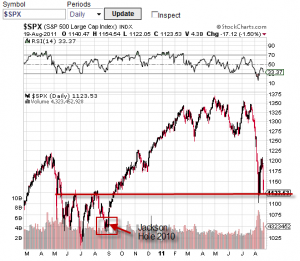Recent stock market action has brought the major indexes into at least a correction zone, if not an outright new bear market. So, if this is a new bear market, how can you dodge another bear bite? [I have 4 suggestions on how to do just that. Read on!] Words: 746
So says John Nyaradi (wallstreetsectorselector.com) in an article* which Lorimer Wilson, editor of www.munKNEE.com (It’s all about Money!), has further edited ([ ]), abridged (…) and reformatted below for the sake of clarity and brevity to ensure a fast and easy read. Please note that this paragraph must be included in any article re-posting to avoid copyright infringement. Nyaradi goes on to explain:
Chart courtesy of stockcharts.com
In the chart of the S&P 500, above, you can see how the index has taken a sharp decline since the highs of mid-July. It is now below its 200 day and 50 day moving averages (red and blue lines) and has broken several long term trend lines. Furthermore, the 50 ma has crossed below the 200 day ma, forming what is widely known as the “death cross” which is a quite reliable statistically proven technical indicator [see here (1) for a recent article on the current “death cross” event]. While not perfect, as no indicator is, the “death cross” has managed to sidestep the biggest part of every recent bear market, while its counterpart, the “golden cross” has captured significant gains during bull markets.
However, it should also be noted that support at the 1120 level has been tested several times and so now the bears will have to push through that level to confirm that we are actually in the beginning days of a new bear market.
Who in the world is currently reading this article along with you? Click here to find out.
It is my opinion that this trading range will not continue for very long and that we’ll see a directional breakout, either up or down, within the next few weeks. Technical and fundamental conditions would indicate that the likely probability of that move would be down. If that turns out to be the case, as investors and traders, we have several choices if we believe a new bear market is upon us:
- to “buy and hold” which is the conventional wisdom and which I believe is quite ineffective in today’s volatile markets since the major indexes are still far below where they were in 2000 at the beginning of the “tech wreck” more than 11 years ago.
- to head for the safety of cash which many investors have done or to head for the safety of Treasury bonds and bills which have also seen a huge influx of funds in recent months and days. This strategy gets you out of harm’s way if the market indeed does continue its downward trajectory.
- to actually attempt to profit from declining markets and to do that, investors/traders today can use inverse exchange traded funds that move opposite to the action of the underlying index…
- to use put options, either as portfolio insurance on currently held positions or as directional bets in search of profits.
So from the above discussion we can conclude that we are at the very least in a significant correction of an ongoing bull market or either in or close to entering a new bear market. Coming days will tell us which way things will go and confirm this one way or other.
Conclusion
Whatever happens, exchange traded funds offer the power and flexibility to seek profits in any market environment.
* http://wallstreetsectorselector.com/2011/08/how-to-dodge-a-bear-bite-etf-news-alert
Title and Link to Article Referenced Above:
1. S&P 500 “Death Cross” Now in Place! What are the Implications?
We have ongoing debt crisis talks in Europe, weak housing data in the U.S., tepid growth in Germany, and higher than expected inflation in the U.K. [and, in addition to] all this “cheerful” news, the recent “death cross” that [has occurred] on the S&P 500 Index. While a “death cross” is concerning and should be respected it does not mean the end of civilization as we know it, however. [Below are the results of a long-term study that clearly defines what the short and mid-term implications are, in fact, for the market.] Words: 700
Editor’s Note:
- The above article consists of reformatted edited excerpts from the original for the sake of brevity, clarity and to ensure a fast and easy read. The author’s views and conclusions are unaltered.
- Permission to reprint in whole or in part is gladly granted, provided full credit is given as per paragraph 2 above.
 munKNEE.com Your Key to Making Money
munKNEE.com Your Key to Making Money
